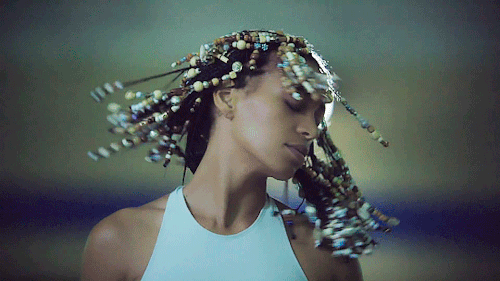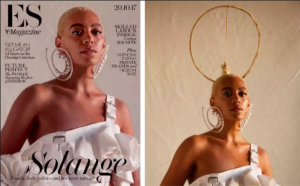Hello. Welcome back to Protest Anthems, the podcast about all things music, social justice, and protest. In this episode, Cielle Tousignant, considers Solange’s 2016 release, “Don’t Touch My Hair.” Solange may not be a household name like her sister, Beyonce, but Solange is certainly making a name for herself in the world of R&B. She has released 4 studio albums; her third, “A Seat At the Table” being her most successful one so far. Solange does more than just make music, she creates a conversation. Her critically acclaimed album has a sound of its own, and the lyrics she writes are moving and important. “Don’t Touch My Hair,” the ninth track on the album, is one of her many songs that address social and racial issues.
Hey guys this is Cielle. I’m here today to talk about a very important song, “Don’t Touch My Hair” by Solange ft. Sampha. This song specifically addresses the social issues that black women face. It’s a simple call to action: “don’t touch my hair.” The song “Don’t Touch My Hair” more specifically addresses consent and microaggressions. This song discusses events that not just Solange has had to deal with but black women throughout history have had to deal with issue in one form or another.
So let me give you a little introduction about the song before we dive into the meaning behind the lyrics. This song was written by Solange, SISAY, Dave Sitek, and Patrick Wimberly. It was released in 2016 and is from Solange’s 3rd studio album “A Seat At The Table”. This song falls under the genre of Alternative R&B, using more jazz, soul, and chill-wave than standard R&B.
First of all, this scenario of someone touching a black woman’s hair happens a lot more often than most people would think. If you don’t notice this issue, or it hasn’t happened to you, most likely, you’re not a black woman. For black women, this sort of microaggression happens all too often. It’s easy to say “so what” or “or what’s the big deal” but if someone on a daily basis gets pointed out as different or not the norm, you can only imagine how frustrating that can get.
Solange is addressing a very specific problem, but behind this one small instance, is centuries of deep-rooted racism and fetishism of black women especially. Yes, 2016 was an especially tension-filled year due to police brutality, the Black Lives Matter protests, and a presidential election winner who is constantly ridiculed for being racist by the American people and the media.
But issues of social racism did not sprout in 2016. The frustrations in 2016, and Solange’s song aren’t due to a recent formation of racism, but a deeply rooted historical and systematic issue.
By touching a black women’s hair, it is both racist and sexist. First, there is the issue of consent. Hair is a part of a person’s body; it is extremely violating to be touched my those who are not invited. Consent is an issue still debated and discussed today, but really it can’t be more simple.
Secondly, black women often see their hair as an expression of their identity and culture. Hair was once used by governments to suppress and classify black people, just take the infamous pencil tests during the Apartheid in South Africa for example. Now black women wear their hair as a sense of empowerment and pride of their culture. As Solange describes, her hair is her soul, her pride, her knowledge… To so many black women, their hair is so much more than just their hair.
Touching a black woman’s hair is a form of micro-aggression. Microaggressions are subtle forms of racism that are often not even intended to be racist.
Solange, herself, was the victim to one of the most FRUSTRATING and DUMB and PUBLIC forms of microaggressions. In October of 2016, about a month after “A Seat At The Table” and “Don’t Touch My Hair” was released, the Evening Standard interviewed the R&B singer. The title alone is called “Solange Knowles on family, body politics and her move into art.” On the cover of the issue, however, the Evening Standard edited out Solange’s braided crown on the cover photo. Solange’s braid was the dramatic focal point of the original photo. Her blonde braid is a large crown, about two feet tall, sitting on top of her head. It is dramatic, angelic, and airbrushed out of the cover photo.
Solange, like most people and celebrities today would, took to Instagram to post the original photo with the caption “dtmh” standing for “dont touch my hair.” The Evening Standard then apologized stating “The decision to amend the photograph was taken for layout purposes but plainly we made the wrong call and we have offered our unreserved apologies to Solange”
This is a perfect example of how naive people can be to their own microaggressions.
The more curious those are by their hair, the more it proves how rarely black women are represented in mainstream media and the fetishism that comes along with it. There are stories all over the internet of women wanting to fit in, wanting to be normal, so they white-wash their heritage and identity by relaxing or straightening their hair. For them, it was easier to succumb to the pressure of society and try to fit in, rather than get looks or feel embarrassed for embracing who they are.
Maybe even more disturbing than being underrepresented, is being fetishized. Kevin Patterson of Poly Role Models defined racial fetishism best, “Taking a fully fledged, well rounded human and limiting them to one aspect of their being that they don’t even have control over. I’m into video games, sports, running, writing, and poly activism. They don’t see all of those things. They see black.”
Fetishism is nothing new to black women. For most of history, black women were seen as some sort of rarity to white men and women. One of the most infamous stories of black women being put on display is the story of Sarah Baartman.
This song is important for all genders and races to hear. Of course black women can empathize and relate better than anyone, but it’s important for everyone to hear what types of discrimination people endure.
This song is a call to action for those who touch black women’s hair to stop immediately, for you don’t fully understand the meaning behind it. This is more than just touching hair; it’s a song about an entire culture, an entire identity, and the pride, strengths and triumphs this group has endured throughout history.


Leave a Reply